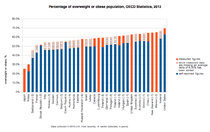Health is wealth
An increasing number of studies and reports from different organizations and contexts examine the linkages between health and different factors, including lifestyles, environments, health care organization and health policy, one specific health policy brought into many countries in recent years was the introduction of the sugar tax. Beverage taxes came into light with increasing concerns about obesity, particularly among youth. Sugar-sweetened beverages have become a target of anti-obesity initiatives with increasing evidence of their link to obesity.[16]– such as the 1974 Lalonde report from Canada;[15] the Alameda County Study in California;[17] and the series of World Health Reports of the World Health Organization, which focuses on global health issues including access to health care and improving public health outcomes, especially in developing countries.[18]
The concept of the "health field," as distinct from medical care, emerged from the Lalonde report from Canada. The report identified three interdependent fields as key determinants of an individual's health. These are:[15]
- Lifestyle: the aggregation of personal decisions (i.e., over which the individual has control) that can be said to contribute to, or cause, illness or death;
- Environmental: all matters related to health external to the human body and over which the individual has little or no control;
- Biomedical: all aspects of health, physical and mental, developed within the human body as influenced by genetic make-up.


Comments
Post a Comment